Here’s the video from the Harvard debate (to understand why I am arguing that libraries are obsolete see this post and this post)
More information about the Harvard series available here.

Scholar | Speaker | Writer | Teacher | Advocate
Here’s the video from the Harvard debate (to understand why I am arguing that libraries are obsolete see this post and this post)
More information about the Harvard series available here.
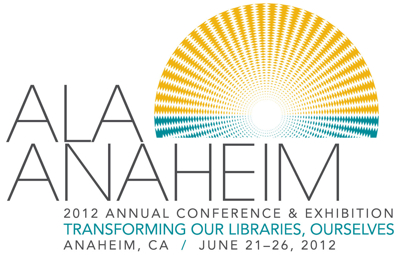
For Immediate Release
Mon, 04/23/2012 – 10:04
Contact: Amy R McGuigan
Conference Services (cs)
CHICAGO — Innovation, thought leaders and technology are keys to transformation, and the 2012 ALA Annual Conference delivers on all those fronts. Energizing, transformative conversations, programs, pre conferences, discussion groups and high-profile speakers are lined up to spark creativity and foster transformative ideas.
Full listings of related events, as well as details about the highlights below, are on the ALA Annual Conference website, where you’ll find the Preliminary Program and other information.
Thought leaders appearing at Annual Conference include ground-breaking thinkers and writers such as Rebecca MacKinnon, David Weinberger, David Lankes, Dan Ariely, Duane Bray, John Jantsch, three amazing young adults–William Kamkwamba, Talia Leman, and Gaby Rodriguez–and many more.
Numerous programs and sessions such as “Cutting-Edge Technology Services,” (Washington Office) and “Top Tech Trends” (LITA) will inform and inspire attendees. In “Cutting-Edge Technology Services,” panelists will share information on innovative services–from QR codes and participatory learning platforms to online and mobile applications–and lessons learned, to help you replicate successful projects. “Top Tech Trends”–always a popular program–features LITA’s ongoing roundtable discussion about trends and advances in library technology by a panel of LITA technology experts describing changes and advances in technology and how the library world can take advantage of these trends.
In the exhibits hall, the Tech Pavilion groups related exhibitors, so attendees can more quickly identify who they need to spend time with and learn about what one librarian described last year as a “panorama of what’s new and exciting in the information industry,” helped by the “awesome vendors.”
Preconferences in the areas of innovation and technology include Mental Model Busting (PLA); Libraries in the Cloud (AASL); Web Content Strategy for Libraries (LITA); Source Code: Digital Youth Participation (YALSA); Building Digital Collections Using Islandora (LITA); Creating Library Linked Data: What Catalogers and Coders Can Build (LITA); and Zines in Libraries (ALA).
Targeted opportunities for conversation include the Library Boing Boing group, getting together to work on what’s cool in the future of libraries and the Networking Uncommons. And ideal for networking and good cheer over lively conversation and excellent drinks is the LITA Happy Hour.
If you need to make the case for attending ALA Annual Conference, these resources may help you. And you can hear more of what your colleagues say–comments like, “It’s the place for new technologies and innovative and creative ideas,” and, “Amazing ideas are born when librarians get together.”
Find out about the many other ALA Annual Conference & Exhibits highlights as they’re added–speakers, events, networking opportunities, and more. And for general information about the meeting in Anaheim, Calif., June 21-26, 2012, visit us at www.alaannual.org. Get the best discount with Early Bird Registration, open until midnight, Sunday, May 13, 2012.
ALA Annual Conference–Transforming Our Libraries, Ourselves.
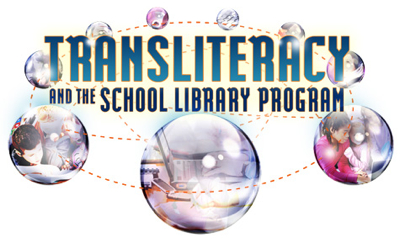
CHICAGO – The American Association of School Librarians (AASL) has added Kristin Fontichiaro and R. David Lankes to the roster of facilitators for AASL’s 2012 Fall Forum, “Transliteracy and the School Library Program.” Fontichiaro and Lankes will join media studies scholar, Henry Jenkins, in providing a comprehensive overview of transliteracy and its importance in education during AASL’s national institute taking place Oct. 12-13, 2012, in Greenville, S.C. More information on Fall Forum can be found at www.ala.org/aasl/fallforum.
Fontichiaro will work with Fall Forum attendees to deconstruct the concept of transliteracy into smaller, more manageable facets. She will focus on the inquiry and rigor of assignments and how to collaboratively work with teachers to empower students with transliteracy skills. With Fontichiaro’s guidance, attendees will build a definition of transliteracy and a supporting vocabulary to take back to schools and use to engage their educational colleagues in the process.
Lankes’ portion of the institute will further elaborate on the collaborative nature of transliteracy. He will advise attendees on how to advocate for and highlight the relevance of school librarians in environment of ever-changing educational priorities. He will guide attendees through building community engagement and cultivating school boards.
Kristin Fontichiaro is a clinical assistant professor at the University of Michigan School of Information, where she coordinates the school library media program. She also co-teaches a teaching with technology course in the University of Michigan school of education. Her most recent edited volumes are “Navigating the Information Tsunami: Engaging Research Projects that Meet the Common Core State Standards, K-5 and Growing Schools: Librarians as Professional Developers.”
Fontichiaro was named an Emerging Leader by the American Library Association, a distinguished alumna by the Wayne State University library and information science program and a 2012 Library Journal Mover and Shaker. She blogs at http://bit.ly/fontblog and writes the “Nudging Toward Inquiry” column for School Library Monthly.
R. David Lankes is a professor and Dean’s Scholar for the New Librarianship at Syracuse University’s school of information studies, director of the library science program for the school and director of the Information Institute of Syracuse. Lankes has always been interested in combining theory and practice to create active research projects that make a difference. His more recent work involves how participatory concepts can reshape libraries and credibility. His book, “The Atlas of New Librarianship,” won the 2012 ABC-CLIO/Greenwood Award for the Best Book in Library Literature.
Lankes is a passionate advocate for libraries and their essential role in today’s society. He also seeks to understand how information approaches and technologies can be used to transform industries. In this capacity he has served on advisory boards and study teams in the fields of libraries, telecommunications, education and transportation including at the National Academies.
The AASL Fall Forum is a multi-day national institute held during non-AASL national conference years. A more intimate event, the institute focuses on one topic of importance to the profession. Transliteracy and the School Library Program will be held Oct. 12-13, 2012, in Greenville, S.C., and via satellite sites in Western Pennsylvania, Eastern Pennsylvania, North Texas and the California Bay Area. More information on programming, sites and registration can be found at www.ala.org/aasl/fallforum.
The American Association of School Librarians, www.aasl.org, a division of the American Library Association (ALA), promotes the improvement and extension of library services in elementary and secondary schools as a means of strengthening the total education program. Its mission is to advocate excellence, facilitate change and develop leaders in the school library field.
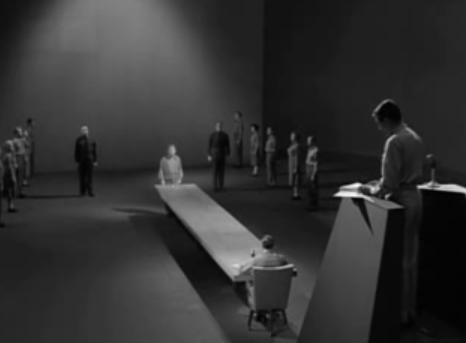
As promised, here is the argument and my own rebuttal from the Harvard event. Special thanks to Meg Backus, Jill Hurst-Wahl and all the great librarians who helped me put this together. I am putting this up in a sort of drafty form because I am interested in how the argument and counter-argument can be made better.
Libraries are Obsolete
There are few of us who can know the exact moment their career ended. However when a professor of library science argues libraries are obsolete against a Harvard law school professor and the head of the lead funding agency in the field I think that moment has arrived. This was where I found myself April 18th when I took part in an Oxford-style debate as part of Harvard Library Strategic Conversations. The idea was to mix humor with serious debate on the proposition that “Libraries are Obsolete.” I was asked to argue for the proposition. Continue reading “Beyond the Bullet Points: Libraries are Obsolete”
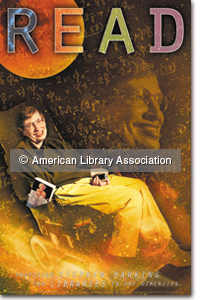
A few weeks back Lane Wilkinson put together a nice thoughtful piece on the Little Free Libraries. While he and I don’t see eye to eye on everything he always makes me think and I have great respect for his point of view. This time he got me thinking about fiction, and the role of recreational reading in libraries.
The following is not really a response to Lane; it doesn’t really need a response. I agree with most of what he says. Also, I’m not hitting every point he makes about stories and shared literary experience (still thinking on that). His noting that my work has “(literally) nothing to say about the aesthetic and cultural value of literature or fiction in libraries” is true. Other than broad strokes that I don’t separate out what we learn from fiction or while we are having fun from non-fiction and when we are doing serious study – I haven’t been explicit. Let me be explicit and ask for your thoughts and reactions. I’ll start with the mission of librarians:
“The mission of librarians is to improve society through facilitating knowledge creation in their communities”
Take a look at the mission again: improving society through facilitating knowledge creation. What ever happened to promoting a love of reading and/or books? Does this adopting this mission mean abandoning reading and literature, fiction and prose? No. The reason reading isn’t in this larger mission is that not all libraries are centrally focused on reading. Where school libraries and public libraries see one of their core goals the promotion and expansion of reading skills (and therefore should include these in their missions); corporate and academic libraries assume the folks they serve already have these skills. What’s more, while reading is a crucial skill to creating knowledge, it is not the exclusive route to “enlightenment.” Some learn through reading, some through video, others through doing (and the vast majority through combining these). We should expect our libraries to support all of these modalities of learning.
When folks ask me about libraries, reading, and my proposed mission they are normally asking “can’t I just use the library to read a good novel or borrow a DVD without worrying about saving the world? Isn’t there value in just reading for recreation?” My answer is yes and that fiction is as important to learning and building knowledge as non-fiction. Stories are how we dream and how we test our ethical bounds. A good novel can often reveal fundamental truth in ways no academic tome of philosophy ever can. What’s more, the ideas and inspirations for great action often come when we least expect it.
Much of library literature focuses on concepts of information and empowerment often ignoring or silently assuming that libraries can still support recreation and reading development. To be sure my work is focused on libraries as places of social engagement and learning. The question isn’t “should libraries support recreational reading.” The answer to that question is dependent on the community — like supporting the arts or parks. The real question revolves around folks who want to turn recreational reading into something social, or geared towards some larger goal.
So I read and love a book. That may be enough for me. But what if a beautiful piece of fiction inspires me to write my own novel, or invent some new device, or form a group of others who love the book and seek to act. It is not the role of the library to predetermine the outcomes of reading (or inventing, or movie making) – that edges too close to telling people what to read and why. Rather it is the place of the library to be a platform for the community member to turn their love and passion into something for the good of the community and/or themselves.
The more we do of something the better we get. So we need to support reading of all kinds where appropriate (in the library, in school, on the playground, on vacation, in the laboratory, in video games). When you read the words “knowledge” and “learning” throughout my work, don’t think I am limiting that to just to the ideas found in textbooks and research articles. Poetry, novels, a good science fiction story all carry equal weight to me in knowledge creation. However, I believe that we should also expect our libraries of all kinds to be ready to support the outcomes of that reading.
You may have seen the announcement that I’m part of a debate at Harvard on the proposition that libraries are obsolete. The twist is (at least it was for me) is that I’m arguing for the proposition – that is that libraries are obsolete.
So why the hell am I doing it? Do I really think that libraries are obsolete? What’s more why should you help me?
First I do not believe that libraries are obsolete. I do, however, believe that it is very worth debating that point. Part of that is my scholarly training. I believe in the Socratic method where you assume opposing sides of an argument (even, as in this case, you don’t agree with the stance) and then argue to the truth. But there is a much more compelling reason I took this on.
We must inhabit the arguments of our detractors if we are to refute them. More than that, to be true to our professional ethos, we must enter this debate with intellectual honesty. If we are here to support conversations, we must support those we agree with and those with which we disagree. Also, if we are to remain relevant we must enter into conversations with the community as whole – whether they agree with us or not.
So that’s why I need your help. What arguments have you encountered against libraries. Why do folks want to eliminate funding, or your library altogether? I promise if you provide them, I’ll make a post (or twelve) doing my best to counter them after my Harvard debate.
Please use the comments below or email me [email protected].
And in two weeks or so if you see a video of me arguing libraries are obsolete, realize I am doing it out of love.
“World Domination Through Librarianship” Kansas Library Association Annual Conference, Wichita, KS.
Abstract: In an era of battling walled content gardens, disruptive change, social media-enabled revolutions, and truthiness there has never been a greater need for librarians. Sorting through mountains of data, ensuring a civil discourse, repairing the fragmenting commons are vital for our country, and librarians are the right profession to lead the way. However, this is not a simple matter of declaring ourselves prepared, it will take new skills and a new librarianship not focused on buildings and artifacts. This talk lays out a foundation for this new librarianship, and a call to action to save the world.
Slides: https://davidlankes.org/rdlankes/Presentations/2012/Kansas.pdf
Audio: https://davidlankes.org/rdlankes/pod/2012/Kansas.mp3
Screencast:
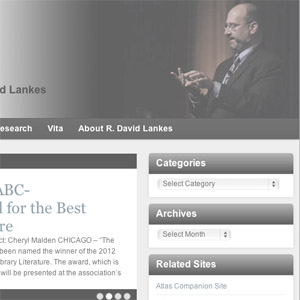 Welcome to my new home page. All the information, posts, and media from the old site are here. I’ve condensed from a homepage and blog, to just one site.
Welcome to my new home page. All the information, posts, and media from the old site are here. I’ve condensed from a homepage and blog, to just one site.
Let me know if you have any suggestions or comments to make it better.
Academic Librarians 2012
The Future is Now! Creatively Reaching and Teaching in Academic Libraries
June 12 & 13, 2012, Syracuse University, Syracuse, NY
Value. Learning. Technology. Librarianship. As with all libraries and organizations, we must constantly demonstrate our value to our stakeholders amidst the changes brought on us at an increasing rate by the technology that we and our students use. Technology shapes our interactions with others, our learning techniques and styles, and our pedagogy; it can affect the way our value is perceived. This year’s conference explores value, community, collaboration, social awareness, and applications that enhance learning. How do we demonstrate the value of the academic library in this changing information environment? How do we reach and teach our students? How is information literacy being transformed? Is it possible to game to learn or learn to game? What is the new librarianship? We invite you to explore these issues with us!
Academic Librarians 2012 is brought to you by the NY 3Rs Association and the Academic and Special Libraries Section of the New York Library Association; in cooperation with the New York State Higher Education Initiative.
KEYNOTE SPEAKERS
Roy Tennant, a Senior Program Officer for OCLC Research. The Once and Future Academic Library. The academic library has for many years been considered the very heart of the university. Today that centrality is challenged by a new set of digital players and the rapidly changing needs of the organizations we serve. What are the challenges and opportunities we face today in remaining the heart of the university? How are some libraries reconfiguring their spaces, their services, and their staff to better serve the needs of the 21st century university?
Dr. David Lankes, Associate Professor, Syracuse University. The Bad, The Good, and The Great. Bad libraries build collections; good libraries build services (after all a collection is only one type of service); great libraries build communities. In a time of great change and challenges to the very model of higher education, libraries must move beyond a focus on collections to a focus on communities. As new models of instruction (flipped classrooms, inquiry based instruction, etc.) and research emerge (interdisciplinary, large scale, collaborative, data driven), libraries find themselves well positioned – but only if they see their strongest assets as the librarians, not the materials librarians have organized. This talk will look to a new librarianship that moves past artifacts to knowledge and sets a new path.
PANEL DISCUSSIONS
Demonstrating Value and Building Relationships.
• Lisa Hinchliffe, Associate Professor at the University of Illinois at Urbana-Champaign (UIUC). On Providing and Documenting Value: Dual Imperatives for Academic Libraries. Academic librarians face a multitude of challenges in responding to user needs as well as economic, technological, and accountability demands. The dual imperatives of providing value to our users and then documenting that value can serve as touchstones we embrace today’s possibilities and create tomorrow’s realities.
• Dr. Nancy Fried Foster, Anthropologist, Director of Anthropological Research, River Campus Libraries, University of Rochester. Finding Information: A Relationship Thing. In studies of how undergraduates use the libraries at the University of Rochester (UR), we have come to see the central importance of relationships among students, their instructors, their friends and relatives, and librarians and other university staff. This talk will give a brief overview of the use of ethnographic methods at the UR libraries. It will then review results of recent projects on how students “learn the ropes” and what faculty expect of them, emphasizing changing relationships and the development of academic interests and competence.
21st Century Literacies.
• Camille Andrews, Learning Technologies and Assessment Librarian, Cornell University. Integrating 21st Century Literacies into the Curriculum. Information literacy, digital literacy, media literacy, visual literacy-what does it all mean and how do they relate? Camille will examine the intersection of current theories of information and other literacies and emerging work in digital media and learning and present some current and possible examples of integration of these 21st century literacies into the curriculum and beyond.
• Trudi Jacobson, Distinguished Librarian and Head of the Information Literacy Department at the University Libraries, University at Albany. How Metaliteracy Changed My Life, My Teaching, and My Students’ Experiences. It has never been easy to attempt to teach students core information literacy competencies, but in the past there seemed to be a fairly stable information environment to grapple with. Today’s information world is amorphous and changing at the speed of light. How do we even keep up, let alone teach students? Might we rely on our students themselves to help bridge the gap? Hear how a teaching method, changing technology, and a revised conception of what constitutes information literacy came together to address the evolving needs of today’s students.
• Kaila Bussert, Visual Resources Outreach Librarian, Olin & Uris Libraries, Cornell University; co-author of ACRL’s Visual Literacy Standards. Visual Literacy in Higher Education: New Standards for 21st Century Learners. Visual literacy is essential for 21st century learners. While today’s college students live in a visually-rich, screen-based world, they are not necessarily prepared to critically engage and communicate with images and visual media in their academic work. To provide guidance for librarians and educators, ACRL developed Visual Literacy Competency Standards for a higher education and interdisciplinary environment. This presentation will describe the new standards, cover the connections between information and visual literacies, and provide examples of ways that the standards can be implemented in library instruction.
Gaming to Learn.
• Chris Leeder, Doctoral Candidate in the School of Information at the University of Michigan. Game-based learning for information literacy. Game-based learning has been the subject of much research, however its application to learning information literacy skills has been barely addressed. The BiblioBouts project explores this possibility through an online information literacy game that engages students in learning research and evaluation skills by competing against their peers to earn points and badges to win the game, while at the same time participating in a learning community through collaborative rating and peer review of the quality of sources. BiblioBouts enlists social gaming to teach information literacy skills to undergraduates while making learning relevant, motivating and fun.
• John Lester, Chief Learning Officer at ReactionGrid. Intersections of the Future: Gaming Technology, Virtual Worlds and the Web. John will share his experiences using gaming technology and virtual world platforms to augment education. He will discuss future trends in specific gaming technologies such as Unity3d along with his work with ReactionGrid on web and mobile-based virtual world platforms. John will also explain common pitfalls when exploring virtual world technologies and highlight the unique affordances of virtual worlds when they are interwoven with existing social media and web-based educational content.
• Dr. Jeremy N. Friedberg, Partner & Lead Developer, Spongelab Interactive. Educating through simulations, game-based learning and the gamification of education. Over the past 40 years we’ve seen the enormous potential game-based learning offers in professional communities from pilots to surgeons – specifically the ability to teach and assess critical thinking and creativity. But making them work in classrooms in the main-stream education system is a huge challenge. Aside from issues with hardware, network security, curriculum, and available time, the effective use of these tools is bound by traditional assessment techniques and the appropriate motivation and rewards to inspire learners. This talk will focus on the design challenges of building educational games, the gamification of simulation, rewards and drivers, and benefits of game-based learning. We’ll also look at the Spongelab Platform as an example of community-driven design and collaborative learning approaches.
RECEPTION
Syracuse University’s iSchool will host a late afternoon reception in Hinds Hall on June 12th. Refreshments and a Tech Sandbox will be available!
Registration packets will also be available for those of you not staying in the dorms.
REGISTRATION INFORMATION
Academic Librarians 2012 is being held consecutively with the New York State Higher Education Initiative (NYSHEI) annual meeting, In with the New. The first 30 people to register and attend the free NYSHEI annual meeting will receive a $20 rebate off the price of the Academic Librarians 2012 conference! Two Conferences, One Trip!
Rates (new, lower rates for this conference!):
Early Bird Registration (now through April 15): $80 NYLA, NY3Rs, or NYSHEI members*?Regular Registration (April 16 and after): $100 NYLA, NY 3Rs, or NYSHEI members*?Non-Members Rates: $125?MLS/MLIS Students: $25
*Most libraries in New York State are members of a NY 3Rs Council, either directly or through their library system. Your library need only be a member of one of the Councils for you to qualify for member rates. Contact any of the conference planners listed below or visit www.ny3rs.org if you have any questions. To see if your library belongs to NYSHEI, visit www.nyshei.org.
TO REGISTER:
Visit http://www.scrlc.org/AcadLib2012 (South Central Regional Library Council [NY 3Rs] is handling this year’s registration.)
Registration Deadline: June 1, 2012 4:00 p.m.Website: http://www.nyla-asls.org/AcademicLibrariansConference/
Twitter @ ALConf2012
ACCOMMODATIONS
The Sheraton Inn has reserved a block of rooms at the rate of $125+ tax per room/single or $135/double. (Be sure to bring your tax-exempt form if this applies to you.) To register with the Sheraton, call 315-475-3000 or 800-395-2105 and reference “Academic Libraries 2012.” Deadline for room reservations at this rate: May 13th.
Dorm Rooms: Dorm rooms are available at a cost of $48.75 for Tuesday night June 12th (price includes linens).
If you will be reserving a dorm room, please pay when you complete the conference registration form. If you will be staying at the Sheraton, you will pay separately for the hotel room.
NOTE: All of the conference activities except for the reception and the tech sandbox on the 12th will be taking place in the Schine Student Center, which is a short walk from the iSchool.
TRAVELING TO SYRACUSE
Syracuse is easy to reach and beautiful in June! The American Automobile Association of Western & Central New York features Syracuse in its Member Connection Spring 2012 issue. See the digital version at http://www.mydigitalpublication.com/publication/?i=99756. Syracuse can be reached by plane, train, bus, or car.
PARKING
$10 per day for those staying on the dorms or commuting to campus; the Sheraton Inn charges $13 per night– $25 up front and they refund $15 upon checkout.
SPONSORS
Thanks to our generous sponsors: EBSCO, Busca, EBL–Ebook Library, LYRASIS, NYLA’s Academic & Special Libraries Section, NY 3Rs Association, Inc., Spongelab, WALDO, and the Syracuse University’s iSchool! It is through their generous donations that we could reduce the cost of this year’s conference.
If you are interested in being a sponsor, it is not too late–please contact Mary-Carol Lindbloom @ ([email protected]).
Need more information? Contact any members of the planning team: Mary-Carol Lindbloom, Debby Emerson ([email protected]), Regan Brumagen ([email protected]), Marcy Strong ([email protected]), or Justin Kani ([email protected]).
Here is a short video on the importance of school librarians Ruth Small, Barbara Stripling (vote Barb for ALA President), and I put together to support the lobby for school librarian in down state NY.